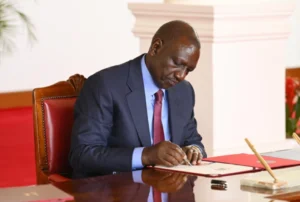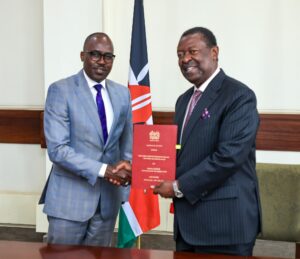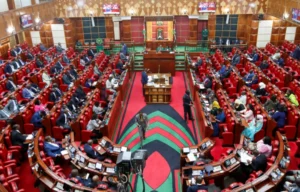Murkomen Criticizes Churches for Not Backing Stricter Alcohol Laws
Tighter controls on alcohol advertising, including banning celebrities under 25 from appearing in adverts and banning alcohol advertising

The CS also took shots at religious leaders, lamenting that none of them had emerged in defense of the policy. According to him, the programme is within the moral responsibility of religious bodies, yet none of them has come out to defend or speak positively about it. Photo/ Courtesy
By Juliet Jerotich
https://www.hubzmedia.africa/murkomen-links-political-actors-to-insecurity-calls-for-stronger-legal-enforcement/ has strongly defended the new suggested alcohol controls, like the plan to raise Kenya’s legal drinking age from 18 to 21, and blamed both church leaders and the alcoholic drinks industry of failing to support the government’s plan.
Speaking to a high-level security meeting in Kajiado County on Saturday, August 2, 2025, Murkomen accused alcohol manufacturers of putting profits ahead of the health of the people. He referred to complaints by one of the largest producers of alcohol that the bill would hurt their earnings, wondering how anyone could oppose an attempt to protect young Kenyans.
I have heard businesses remark that the law will be detrimental to their enterprises. But can one fairly argue that raising the drinking age from 18 to 21 is bad for business? What about the future of our children?” Murkomen questioned.
The CS also took shots at religious leaders, lamenting that none of them had emerged in defense of the policy. According to him, the programme is within the moral responsibility of religious bodies, yet none of them has come out to defend or speak positively about it.
“The very people who call themselves church leaders have been silent. None of them has defended this law or called it the right thing,” he said.
The National Policy on the Prevention, Management, and Control of Alcohol, Drugs, and Substance Abuse draft, prepared by NACADA, seeks to tackle the rising problem of substance abuse in Kenya. Besides increasing the drinking age limit, the policy suggests sweeping reforms:
* Ban on online sales and home deliveries of alcohol.
* Prohibition of hawking and vending machine sales of alcohol.
* Stricter controls on supermarket and petrol station sales of alcohol near schools and residential areas.
* Tighter controls on alcohol advertising, including banning celebrities under 25 from appearing in adverts and banning alcohol advertising on TV, radio, and online between the hours of 5:00 am and 10:00 pm.
* Elimination of small sachets and bottles via a 250ml minimum packaging size.
* Government control over licensing of alcohol production, distribution, and outlet location.
Billboards that promote alcohol outdoors would also be greatly limited, and companies would no longer be in a position to sponsor events for young people. Producers will also be required to list ingredients and display explicit health warnings on packaging.
Murkomen indicated that the interventions were intended to protect children as well as the future of Kenya, and that the economy could not be put ahead of public safety and health.





